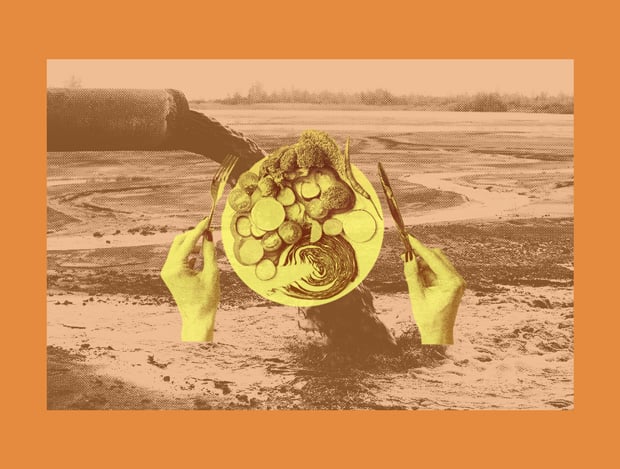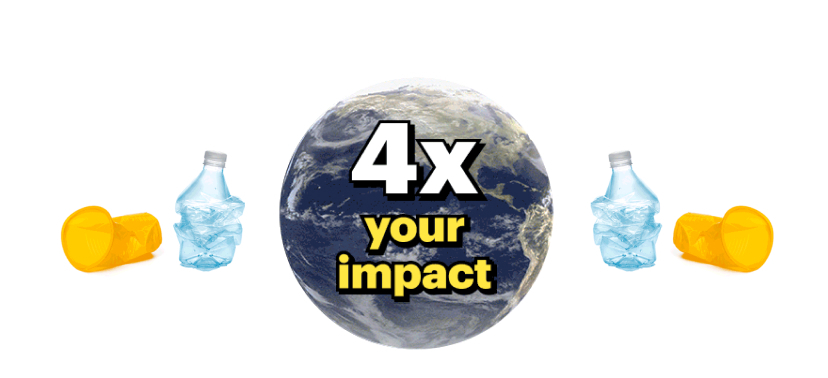How Sewage Sludge Carries Toxic PFAS from Toilet to Table
Published Feb 8, 2024

Sludge, a byproduct of sewage treatment, is often spread on fields as fertilizer. But growing research shows that toxic chemicals like PFAS are lurking in the muck — and getting into our food.
A few years ago, state testing at dozens of Maine farms uncovered alarming levels of toxic PFAS contamination. These forever chemicals were in the soil and water, crops and animals. Farms throughout the state were forced to shutter or cull their herds.
While some farms have recovered, others have not. Some farmers have tested themselves and their families, finding high levels of PFAS contamination in their bodies.
The main culprit: sewage sludge, the leftovers from treating wastewater. In many states, it’s common practice — and even encouraged by state officials — for farmers to spread sludge on their fields as fertilizer.
But, as the crisis in Maine has shown, the practice has worrying impacts on public health and our food system. Notably, it’s yet another channel for harmful PFAS to make their way into our food, bodies, and lives.
What Exactly Is Sludge?
Think for a moment about everything we flush down our drains: soaps, cleaning chemicals, medicines, waste. In most of the United States, all of this flows through sewer systems and into sewage treatment plants. These plants may also process everything from industrial waste to the liquid that leaks from landfills.
Sewage treatment plants process it all and leave behind sludge — a mass of solid waste — plus all the pollutants and chemicals that were removed, but not destroyed, in the treatment processes. In fact, many drugs and personal care products exit treatment plants unchanged from how they entered.
The U.S. generates millions of tons of sludge every year, and it all needs to go somewhere. Sewage treatment plants sell nutrient-rich sludge to farmers as low-cost fertilizer. Nearly half of all our sludge is spread on fields. Some sewage plants have even sold or given it away to residents to fertilize home gardens.
But sludge isn’t a green plant food — it’s riddled with harmful chemicals that leach into soil, plants, water, and even the food we eat.
PFAS Forever Chemicals and Other Dangers of Sludge
Sludge harbors a mishmash of all kinds of dangerous substances, including:
- Heavy metals such as lead, copper, and mercury,
- Endocrine-disrupting chemicals, which can harm our reproductive systems, suppress our immune systems, and increase our risk of cancer, and
- Microplastics, which spread the various chemicals added to plastic, such as flame retardants and endocrine disruptors.
Additionally, as the crisis in Maine revealed, sludge is a huge conveyor of PFAS forever chemicals. One farm saw PFAS levels in its water 400 times higher than state limits.
PFAS (per- and polyfluoroalkyl substances) are a class of thousands of chemicals. They’re widely used in all kinds of products for their non-stick, stain-repelling, water-proofing properties. However, these properties have made them unnaturally persistent. PFAS don’t easily break down in the environment, and once they get in our bodies, they build up there over time.
Growing research is finding them everywhere — food, water, packaging, plastics, clothing, and our blood. To make matters worse, they’re linked to a litany of health problems.
Sewage sludge presents yet another contamination pathway. PFAS leach from sludge and into our soil and groundwater. They can be absorbed by the plants we eat. And they travel from contaminated feed to dairy cows and their milk.
Farms throughout the country have faced similar contamination. In several states, residents and advocates are voicing concerns about sludge and its role in PFAS contamination.
The Solutions: More Wastewater Funding and More Regulation on Toxic Chemicals
Since discovering its crisis, Maine has done more than any state to address PFAS through policy. It outlawed spreading sludge on fields and passed a ban on non-essential uses of PFAS. Last summer, the state legislature established a $60 million fund to help farms contaminated by PFAS.
We need policies like Maine’s nationwide. We can start by banning the spread of sewage sludge on fields, but we also need to cut PFAS pollution at the source and provide support to communities facing contamination.
In recent decades, federal support for wastewater infrastructure has fallen. Public sewage treatment plants need $271 billion for maintenance and upgrades, just to comply with federal law. If they don’t get funding support, the costs will fall on families through bigger water bills. So legislation like the WATER Act — which sets aside funds for water and wastewater infrastructure, including to address water contaminants like PFAS — is essential.
At the same time, we need to stop the use of toxic chemicals that end up in sewage plants, point-blank. And we need to hold accountable the corporations that flooded our lives with PFAS in the first place.
So far, national efforts have sought to address only a handful of PFAS. This approach makes no sense when there are thousands of them, all with similarly harmful properties. Instead, we need bills like the PFAS Action Act, which lays the groundwork for regulating all PFAS. It provides a clear definition of these toxics and holds polluters accountable for cleanup.
Farmers deserve secure livelihoods without fear of toxic chemicals. Families deserve to eat healthy food without fearing it’ll make them sick. With powerful policy, we can address the PFAS crisis and prevent more harm from sludge, or any other source of PFAS pollution.
We need protections from PFAS, ASAP. Tell Congress to pass the PFAS Action Act!

Time to face it —~it’s people or plastics.~We can’t have both.
Become a plastic pollution fighter this Earth~ Day and have your gift MATCHED $3-to-$1!
Enjoyed this article?
Sign up for updates.
TO TOP


